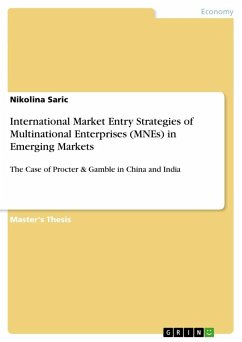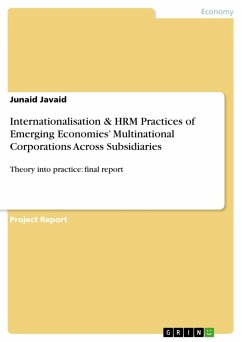
How do multinational companies from emerging markets gain competitive advantages in global markets?

PAYBACK Punkte
0 °P sammeln!
Bachelor Thesis from the year 2017 in the subject Business economics - Business Management, Corporate Governance, grade: 1,3, Friedrich-Alexander University Erlangen-Nuremberg (Department of International Management), language: English, abstract: The purpose of the thesis is to present selected business strategies and link them with the ability of Emerging Market Multinational Enterprises (EMNEs) to build and strengthen competitive advantages. Further to that uses the thesis empirical case studies of Tata Motors from India and Lenovo from China to analyse their performance and competitive adva...
Bachelor Thesis from the year 2017 in the subject Business economics - Business Management, Corporate Governance, grade: 1,3, Friedrich-Alexander University Erlangen-Nuremberg (Department of International Management), language: English, abstract: The purpose of the thesis is to present selected business strategies and link them with the ability of Emerging Market Multinational Enterprises (EMNEs) to build and strengthen competitive advantages. Further to that uses the thesis empirical case studies of Tata Motors from India and Lenovo from China to analyse their performance and competitive advantages.The results of the thesis reveal that EMNEs employ competitive advantages which underpin their expansion abroad. These advantages are mainly built by finding innovative opportunities to leverage country specific advantages. In addition, competitive advantages are obtained by accessing new knowledge in advanced markets through cross-border acquisitions. The case studies reveal, that EMNEs acquire abroad to access knowledge such as brand reputation and technologies. As a result, the international value chain structure needs to be configured.A meaningful phenomenon of global competitiveness is the increasing amount of Emerging Market Multinational Enterprises (EMNEs) that have succeeded in the con- straining institutional home markets and are now participating globally due to foreign direct investments. However, despite the increase in academic research explaining the internationalization of EMNEs, little research has been carried out to analyse the success of EMNEs.













